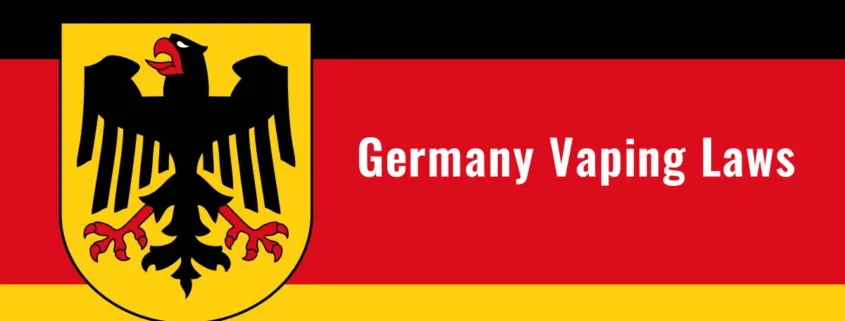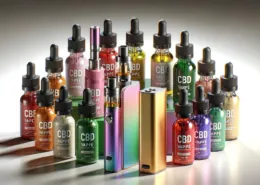Comprehensive Guide to Vaping Laws in Germany
Germany’s approach to vaping regulations reflects the country’s commitment to public health and consumer safety. As vaping has grown in popularity, particularly as an alternative to smoking, Germany has established a robust legal framework to govern its use, sale, and promotion. Understanding these laws is critical for those involved in the vaping industry, as well as for consumers who want to ensure they comply with national regulations.
History of Vaping Regulations in Germany
Germany’s journey to regulate vaping began in the early 2000s when vaping first emerged as a new way to consume nicotine. Initially, there was little to no regulation, leading to a surge in the popularity of vaping devices and e-liquids. However, concerns over health and safety quickly prompted legislative action.
The turning point came in 2016 with the implementation of the EU Tobacco Products Directive (TPD), which imposed strict guidelines on the manufacturing, marketing, and sale of vaping products across all EU member states, including Germany. This directive was instrumental in shaping the current regulatory environment, ensuring that vaping products are safe, well-regulated, and sold responsibly.
Current Legal Framework for Vaping
Germany’s legal framework for vaping is comprehensive and covers all aspects of the industry, from the production and sale of e-liquids and devices to where and how they can be used. These laws are designed to protect consumers, particularly minors, and to ensure that vaping remains a safe alternative to traditional smoking.
Key Regulatory Bodies
Several government entities oversee vaping regulations in Germany:
- Federal Ministry of Health (Bundesministerium für Gesundheit)
- Federal Office for Consumer Protection and Food Safety (Bundesamt für Verbraucherschutz und Lebensmittelsicherheit)
- Federal Institute for Risk Assessment (Bundesinstitut für Risikobewertung)
These organizations collaborate to develop, implement, and enforce vaping regulations across the country.1
● Legal Age for Vaping
In Germany, the legal age for purchasing and using vaping products is 18 years old. This regulation is strictly enforced across all sales channels, including physical stores and online platforms. Retailers are required by law to verify the age of all customers purchasing vaping products. Failure to comply with these age restrictions can result in significant fines and other penalties for both the retailer and the consumer.
● How Age Restrictions Are Enforced
Germany has implemented stringent measures to ensure that age restrictions are followed. Retailers must request identification from any customer who appears to be under the age of 25. Online retailers are required to implement age verification processes at the point of sale and during delivery2. These measures are designed to prevent minors from accessing vaping products, which could lead to long-term health consequences.
Product Standards and Safety
Germany’s product standards for e-cigarettes align with the European Union’s Tobacco Products Directive (TPD), which sets stringent requirements to ensure the safety and quality of vaping products. Key provisions under the TPD include:
● E-Liquid Regulations
- Nicotine Concentration: The maximum allowed concentration is 20mg/ml (2%)3.
- Bottle Size: Nicotine-containing e-liquids are limited to 10ml bottles.
- Ingredients: All ingredients must be of high purity. Certain additives, particularly those with CMR (Carcinogenic, Mutagenic, or Reprotoxic) properties, are prohibited4.
- Childproof Packaging: All e-liquid containers must feature childproof caps to prevent accidental ingestion.
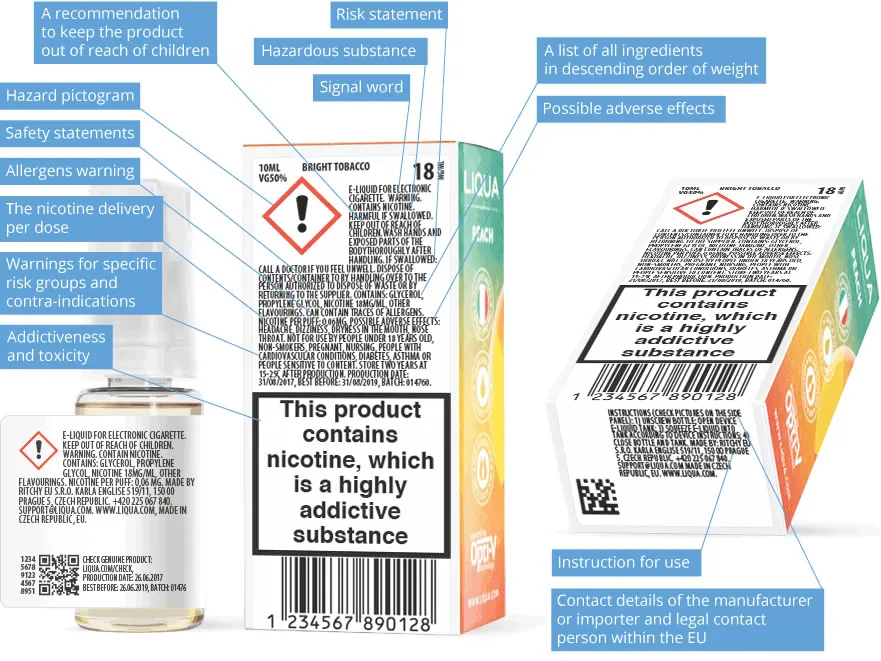
● Device Regulations
- Tank Capacity: Refillable tanks must not exceed 2ml capacity. This limit aims to control liquid consumption and potential nicotine intake.
- Safety Features: Devices must incorporate leak-proof filling mechanisms and protection against breakage. These features enhance user safety and product reliability.
- Emissions Testing: Before market release, products must undergo rigorous emissions testing to ensure they meet safety standards5.
● Notification and Registration
Manufacturers and importers must notify the Federal Office for Consumer Protection and Food Safety of all products before market entry. This notification process includes:
- Detailed ingredient lists
- Toxicological data
- Emissions test results
- Comprehensive product descriptions and operational information
This process ensures transparency and allows authorities to monitor product safety effectively.
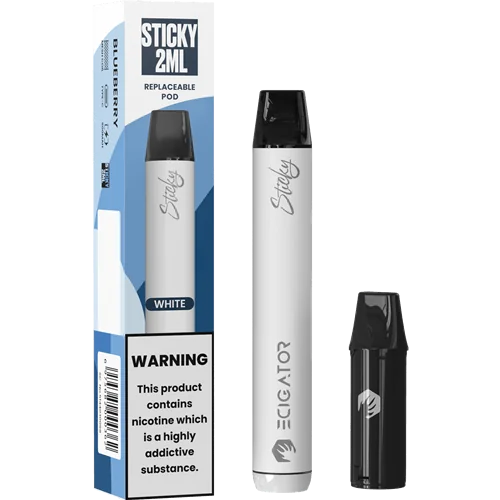
Ecigator Sticky Prefilled Pod Kit
The Ecigator Sticky Prefiiled Replaceable Vape Pod Kit is new kind of vape kit which the prefilled disposable pod can be changed.
That means you don’t need to throw away the whole kit but just change another pod. Also you can change the pods to taste different flavors.
Regulation on the Sale of Vaping Products
Germany’s regulations on the sale of vaping products are designed to ensure that only safe, high-quality products are available to consumers. The sale of vaping products is restricted to licensed retailers, and all products must meet specific safety and quality standards as outlined by both German and EU laws.
● Where and How Vaping Products Can Be Sold
Vaping products can only be sold in licensed establishments, which include specialized vape shops and some retail outlets like convenience stores and supermarkets. These locations are required to adhere to strict guidelines regarding the display and sale of vaping products, including ensuring that these products are not accessible to minors. Vending machines, a common method for selling cigarettes, are not permitted to dispense vaping products due to the inability to effectively verify the age of the purchaser.
● Online Sales and Regulations
Online sales of vaping products are allowed in Germany, but they are subject to rigorous regulations. Websites selling vaping products must implement robust age verification systems to prevent sales to minors. Additionally, all products sold online must comply with the same safety and packaging standards as those sold in physical stores. This includes clear labeling of ingredients, nicotine content, and appropriate health warnings.
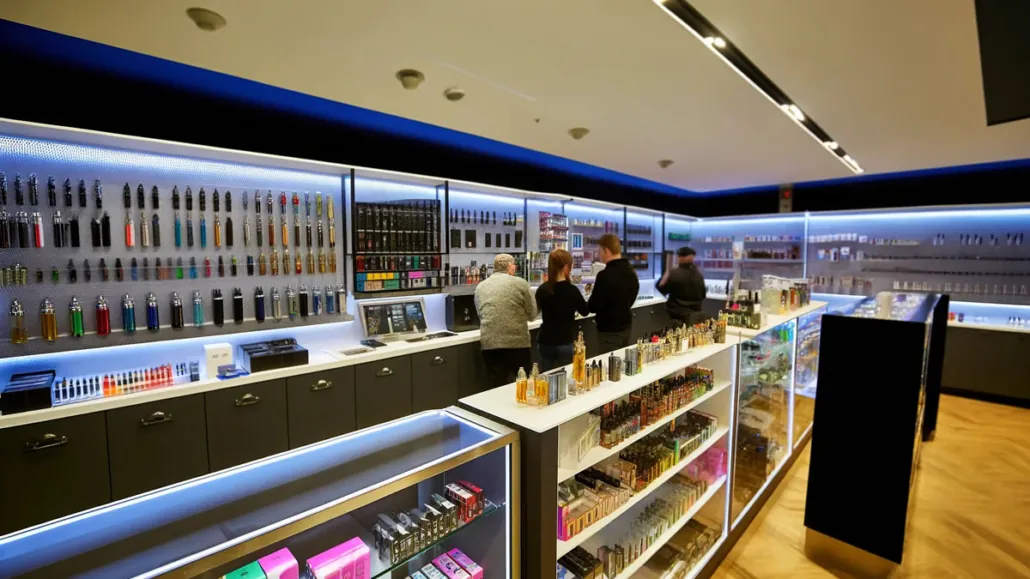
Advertising and Marketing Restrictions
Germany enforces strict regulations on the advertising and promotion of vaping products. These regulations are intended to prevent the marketing of vaping products to minors and to ensure that all advertising is responsible and does not mislead consumers.
● Restrictions on Advertising
Advertising vaping products in Germany is heavily regulated. For example, ads targeting minors or suggesting that vaping is a healthier or safer alternative to smoking are prohibited. Furthermore, the use of vaping products in television and radio ads is restricted, limiting the exposure of these products to potentially vulnerable populations. This is in line with the EU Tobacco Products Directive, which aims to reduce the appeal of nicotine products to young people.
Permitted Advertising Channels
- Print media (with some restrictions)
- Outdoor advertising
- Point-of-sale marketing materials
Prohibited Advertising Methods
- Television and radio advertisements
- Sponsorship of events with cross-border effects
- Claims of health benefits or smoking cessation
● Differences Between Vaping and Tobacco Product Promotions
While both vaping and traditional tobacco products are subject to advertising restrictions, vaping products face additional scrutiny. For instance, while some tobacco advertising is permitted under certain conditions, vaping products are generally prohibited from being advertised in ways that could appeal to minors or non-smokers6.
Vaping in Public Places
Germany regulates where vaping is permitted to protect non-users from exposure to secondhand vapor and to maintain public health standards. These regulations mirror many of the restrictions placed on smoking traditional cigarettes.

Where Vaping is Allowed and Prohibited
Vaping is prohibited in many public spaces in Germany, including public transportation, educational institutions, and healthcare facilities. These bans are enforced to protect individuals, particularly children and patients, from potential harm associated with secondhand vapor exposure.
● Public Transportation and Vaping
Vaping is not allowed on any form of public transportation in Germany, including buses, trains, and trams. This ban is strictly enforced, with penalties for those who violate it. The goal is to ensure a comfortable environment for all passengers, free from exposure to vapor, which can be irritating or harmful to some individuals.
● Vaping in Restaurants and Bars
The rules regarding vaping in restaurants and bars in Germany can vary depending on the establishment’s policies. While some venues may permit vaping, others may enforce strict no-vaping policies, similar to smoking bans. This allows establishments to cater to the preferences of their clientele while complying with broader public health regulations.
● Vaping in Educational and Healthcare Institutions
Germany prohibits vaping in all educational and healthcare institutions. This includes schools, universities, hospitals, and clinics. The rationale behind this ban is to protect vulnerable populations, including children, adolescents, and patients, from exposure to potentially harmful substances.
Cross-border Considerations
Germany’s vaping laws extend to international travelers and those importing vaping products. It is essential to be aware of these regulations to avoid potential legal issues.
● Importing Vaping Products into Germany
Travelers are allowed to bring vaping devices and e-liquids into Germany for personal use, but these products must comply with the country’s safety and quality standards. Large quantities, which might suggest intent to sell, could be subject to inspection by customs officials. Non-compliant products may be confiscated, and fines could be imposed.
● Traveling with Vaping Devices
When traveling to Germany with vaping devices, it is important to check the regulations in both your departure and arrival countries. Ensure that your vaping device is packed in your carry-on luggage, as many airlines do not allow these devices in checked baggage. Additionally, be aware of the specific rules regarding the use of vaping devices in public and private spaces within Germany.

Vaping Tax in Germany
Germany has implemented taxes on vape products to discourage harmful smoking habits and align with European Union regulations. E-liquids, regardless of flavors, are subject to taxation, with the primary tax being the value-added tax (VAT), known as “Mehrwertsteuer” in German. Other potential taxes, such as excise duties, may also apply to vape products.
● Current Tax Rates (as of 2024)
- E-Liquids: €0.16 per milliliter
- Disposable E-Cigarettes: €1.60 per device
This taxation approach aims to balance public health goals with market stability7. Vape manufacturers consider various factors when determining pricing, including production costs, taxes, and market competition.
Enforcement and Penalties
Germany takes the enforcement of vaping laws seriously, with multiple regulatory bodies overseeing compliance. Fines for violations can range from €5,000 to €100,000, depending on the severity of the infraction.
● Penalties for Illegal Sales
Selling vaping products to minors or without the proper licensing can result in significant fines and, in extreme cases, imprisonment. Retailers found in violation of these laws may also have their licenses revoked, preventing them from selling any nicotine-related products in the future .
● Penalties for Underage Use
Minors caught using vaping products may face fines, and repeat offenders could be subject to additional penalties. However, the primary focus is on education and prevention, with efforts aimed at reducing the initiation of vaping among young people.
● Penalties for Violating Advertising Restrictions
Companies that violate advertising restrictions face substantial fines and potential legal action from consumer protection agencies. These penalties serve as a deterrent to prevent the irresponsible promotion of vaping products, particularly to minors and non-smokers .

ECIGATOR
Ecigator is one of the well-known vape brands spun off from FM Technology Co., Ltd, it’s an ISO-certified disposable vape manufacturer for OEMs, ODMs, and OBM since 2010. The founder team comes from top firms with more than 10 years of experience in the vaping industry and has devoted thousands of hours to providing users with a better and better experience.
Navigating the Legal Landscape: Best Practices for Compliance
To thrive in Germany’s regulated vaping market, industry professionals must prioritize compliance with all aspects of the law. This involves:
- Staying Informed: Regularly review updates to local and EU-wide regulations to ensure ongoing compliance.
- Educating Staff: Train employees on legal requirements, particularly those related to age verification, advertising restrictions, and product safety.
- Engaging Legal Counsel: Consider consulting with legal experts who specialize in vaping laws to navigate complex regulatory challenges.
By adopting these practices, businesses can minimize legal risks and build a reputation as responsible, compliant players in the industry.
Conclusion
Germany’s vaping laws are designed to protect public health and ensure that vaping products are safe for consumers. From strict age restrictions and advertising bans to rigorous safety standards for e-liquids and devices, these laws provide a comprehensive framework for the regulation of vaping. As the industry continues to evolve, staying informed about these regulations is essential for anyone involved in the vaping sector.
Resources:
- Federal Ministry of Health – https://www.bundesgesundheitsministerium.de/ ↩︎
- Youth Protection Act – https://www.gesetze-im-internet.de/juschg/ ↩︎
- EU Tobacco Products Directive – https://ec.europa.eu/health/tobacco/products_en ↩︎
- Federal Institute for Risk Assessment – https://www.bfr.bund.de/en/home.html ↩︎
- Federal Office for Consumer Protection and Food Safety – https://www.bvl.bund.de/EN/Home/home_node.html ↩︎
- German Advertising Standards Council – https://www.werberat.de/ ↩︎
- Federal Ministry of Finance – Tobacco Tax Information – https://www.bundesfinanzministerium.de/Content/DE/Standardartikel/Themen/Steuern/Steuerarten/Tabaksteuer/tabaksteuer.html ↩︎
- Malaysia Negeri Sembilan Backs Vape Ban, Awaits Clear Laws - August 5, 2025
- Is It Illegal to Vape or Smoke While Driving in Massachusetts? - August 5, 2025
- Austria Plans to Ban Disposable E-Cigarettes - August 5, 2025

